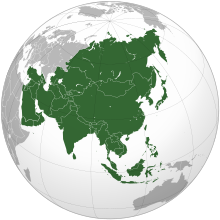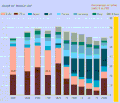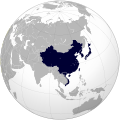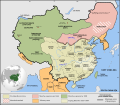Portal:Asia

 Asia (/ˈeɪʒə/ AY-zhə, UK also /ˈeɪʃə/ AY-shə) is the largest continent in the world by both land area and population. It covers an area of more than 44 million square kilometers, about 30% of Earth's total land area and 8% of Earth's total surface area. The continent, which has long been home to the majority of the human population, was the site of many of the first civilizations. Its 4.7 billion people constitute roughly 60% of the world's population. Asia shares the landmass of Eurasia with Europe, and of Afro-Eurasia with both Europe and Africa. In general terms, it is bounded on the east by the Pacific Ocean, on the south by the Indian Ocean, and on the north by the Arctic Ocean. The border of Asia with Europe is a historical and cultural construct, as there is no clear physical and geographical separation between them. A commonly accepted division places Asia to the east of the Suez Canal separating it from Africa; and to the east of the Turkish straits, the Ural Mountains and Ural River, and to the south of the Caucasus Mountains and the Caspian and Black seas, separating it from Europe. Since the concept of Asia derives from the term for the eastern region from a European perspective, Asia is the remaining vast area of Eurasia minus Europe. Therefore, Asia is a region where various independent cultures coexist rather than sharing a single culture, and the boundary between Europe is somewhat arbitrary and has moved since its first conception in classical antiquity. The division of Eurasia into two continents reflects East–West cultural differences, some of which vary on a spectrum. (Full article...) Featured articleThe Battle for Henderson Field, also known as the Battle of Guadalcanal or Battle of Lunga Point by the Japanese, took place from 23 to 26 October 1942 on and around Guadalcanal in the Solomon Islands. The battle was a land, sea, and air battle of the Pacific campaign of World War II and was fought between the Imperial Japanese Army and Navy and Allied forces, mainly U.S. Marines and Army. The battle was the last of three major land offensives conducted by the Japanese during the Guadalcanal campaign. In the battle, U.S. Marine and Army forces repulsed an attack by the Japanese 17th Army under the command of Lieutenant General Harukichi Hyakutake. The American forces were defending the Lunga perimeter that guarded Henderson Field on Guadalcanal, which the Allies had captured from the Japanese in landings on Guadalcanal on 7 August 1942. Hyakutake's force was sent to Guadalcanal in response to the Allied landings with the mission of recapturing the airfield and driving the Allied forces off the island. His soldiers conducted numerous assaults over three days at various locations around the Lunga perimeter, all repulsed with heavy Japanese losses. At the same time, Allied aircraft operating from Henderson Field successfully defended American positions on Guadalcanal from attacks by Japanese naval air and sea forces. (Full article...) Selected Country Japan is an island country in East Asia. It is located in the Pacific Ocean off the northeast coast of the Asian mainland, and is bordered on the west by the Sea of Japan and extends from the Sea of Okhotsk in the north to the East China Sea in the south. The Japanese archipelago consists of four major islands—Hokkaido, Honshu, Shikoku, and Kyushu—and thousands of smaller islands, covering 377,975 square kilometres (145,937 sq mi). Japan has a population of nearly 124 million as of 2024, and is the eleventh-most populous country. Its capital and largest city is Tokyo; the Greater Tokyo Area is the largest metropolitan area in the world, with more than 38 million inhabitants as of 2016. Japan is divided into 47 administrative prefectures and eight traditional regions. About three-quarters of the country's terrain is mountainous and heavily forested, concentrating its agriculture and highly urbanized population along its eastern coastal plains. The country sits on the Pacific Ring of Fire, making its islands prone to destructive earthquakes and tsunamis. The first known habitation of the archipelago dates to the Upper Paleolithic, with the beginning Japanese Paleolithic dating to c. 36,000 BC. Between the fourth and sixth centuries, its kingdoms were united under an emperor in Nara, and later Heian-kyō. From the 12th century, actual power was held by military dictators (shōgun) and feudal lords (daimyō), and enforced by warrior nobility (samurai). After rule by the Kamakura and Ashikaga shogunates and a century of warring states, Japan was unified in 1600 by the Tokugawa shogunate, which implemented an isolationist foreign policy. In 1853, a United States fleet forced Japan to open trade to the West, which led to the end of the shogunate and the restoration of imperial power in 1868. In the Meiji period, the Empire of Japan pursued rapid industrialization and modernization, as well as militarism and overseas colonization. In 1937, Japan invaded China, and in 1941 attacked the United States and European colonial powers, entering World War II as an Axis power. After suffering defeat in the Pacific War and two atomic bombings, Japan surrendered in 1945 and came under Allied occupation. After the war, the country underwent rapid economic growth, although its economy has stagnated since 1990. (Full article...) Featured biographyAbū Bakr Muḥammad ibn Ṭughj ibn Juff ibn Yiltakīn ibn Fūrān ibn Fūrī ibn Khāqān (8 February 882 – 24 July 946), better known by the title al-Ikhshīd (Arabic: الإخشيد) after 939, was an Abbasid commander and governor who became the autonomous ruler of Egypt and parts of Syria (Levant) from 935 until his death in 946. He was the founder of the Ikhshidid dynasty, which ruled the region until the Fatimid conquest of 969. The son of Tughj ibn Juff, a general of Turkic origin who served both the Abbasids and the autonomous Tulunid rulers of Egypt and Syria, Muhammad ibn Tughj was born in Baghdad but grew up in Syria and acquired his first military and administrative experiences at his father's side. He had a turbulent early career: he was imprisoned along with his father by the Abbasids in 905, was released in 906, participated in the murder of the vizier al-Abbas ibn al-Hasan al-Jarjara'i in 908, and fled Iraq to enter the service of the governor of Egypt, Takin al-Khazari. Eventually he acquired the patronage of several influential Abbasid magnates, chiefly the powerful commander-in-chief Mu'nis al-Muzaffar. These ties led him to being named governor first of Palestine and then of Damascus. In 933, he was briefly named governor of Egypt, but this order was revoked after the death of Mu'nis, and Ibn Tughj had to fight to preserve even his governorship of Damascus. In 935, he was re-appointed to Egypt, where he quickly defeated a Fatimid invasion and stabilized the turbulent country. His reign marks a rare period of domestic peace, stability and good government in the annals of early Islamic Egypt. In 938 Caliph al-Radi granted his request for the title of al-Ikhshid, which had been borne by the rulers of his ancestral Farghana Valley. It is by this title that he was known thereafter. (Full article...) General imagesThe following are images from various Asia-related articles on Wikipedia. Featured picturePhong Nha-Kẻ Bàng is a national park and UNESCO World Heritage Site in the Bố Trạch and Minh Hóa districts of central Quảng Bình Province in the North Central Coast region of Vietnam. The park was created to protect one of the world's two largest karst regions with 300 caves and grottoes and also protects the ecosystem of limestone forest of the Annamite Range region in North Central Coast of Vietnam.
Did you know...
Updated: 6:33, 14 February 2024 In the news
Related portalsMajor Religions in Asia Middle East Central Asia and Caucasus Indian Subcontinent Southeast Asia East Asia Selected panorama
Baalbek is a town in the Beqaa Valley of Lebanon situated east of the Litani River. It is famous for its exquisitely detailed yet monumentally scaled temple ruins of the Roman period, when Baalbek, then known as Heliopolis, was one of the largest sanctuaries in the Empire. TopicsCategoriesAssociated WikimediaThe following Wikimedia Foundation sister projects provide more on this subject:
More portalsShortcuts to this page: Asia portal • P:ASIA Purge server cache |






























































































